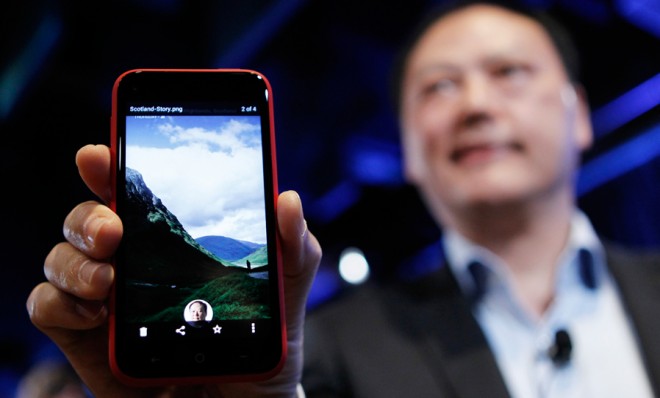Will Facebook's mobile focus save the social network?
The social giant is betting on exploding mobile usage to monetize information gleaned from its 1 billion users

A free daily email with the biggest news stories of the day – and the best features from TheWeek.com
You are now subscribed
Your newsletter sign-up was successful
Technology's great migration to mobile was bound to create opportunities — and challenges — for the world's leading social network.
As for the opportunities: On Wednesday, Facebook announced that first quarter revenue is up 38 percent from this time last year to a solid $1.42 billion. Profits are up 12 cents per share, just under analysts' expectations — but enough to nudge shares up slightly Thursday morning. The CEO of the social network, Mark Zuckerberg, was quick to highlight its rapid switch from desktop to mobile — an industry-wide trend propelled in part by Twitter and Instagram. Though Zuckerberg claims Facebook was late to the mobile game, by late last year the number of Facebook's daily mobile users surpassed the number using Facebook on desktops. "There's no argument," Zuckerberg said in January, "Facebook is a mobile company."
Of course, part of that evolution — with its resulting revenue bump — has been finding ways to advertise on the mobile platform, something Facebook is quickly getting the hang of. In just three quarters, revenue from mobile has risen to 30 percent of total ad revenue.
The Week
Escape your echo chamber. Get the facts behind the news, plus analysis from multiple perspectives.

Sign up for The Week's Free Newsletters
From our morning news briefing to a weekly Good News Newsletter, get the best of The Week delivered directly to your inbox.
From our morning news briefing to a weekly Good News Newsletter, get the best of The Week delivered directly to your inbox.
A large chunk of that 30 percent comes from app-install ads, which let developers promote their apps on Facebook with an accompanying "install" button that the user can click to download the app. According to TechCrunch, Facebook CFO Sheryl Sandberg said 3,800 developers bought ads this quarter, driving more than 25 million installs.
But Ryan Tate at Wired isn't confident these ads will prove a sustainable revenue stream: "These are, generally speaking, speculative advertisers, often venture backed, hoping to get rich off their software — exactly the type of businesses that tend to disappear when there's a cyclical downturn in the now-booming tech sector," he writes.
Another feature of the switch to mobile that has proven tricky: Facebook Home — a program for select Android devices that keeps users on Facebook by taking over a phone's home screen. The program is "off to a rough start" says CNET's Jennifer Van Grove, citing low install-rates and bad reviews since the program's April 12 release. Wired's Alexandra Chang attributes the lack of adoption to "the 'too much Facebook' problem." While millions of users are quite content accessing Facebook on their own schedule (read: every five minutes), they don't seem to appreciate Home's invasiveness and constant presence. That's not good for a decidedly mobile company looking to be a part of every facet of our lives.
Nevertheless, on the advertising front, Facebook is marching forward with its quest for ubiquity. The executives at the social network have quickly learned that mobile allows brands to target potential customers with unprecedented accuracy. There was a point in time when Facebook was content to target based on data it collected directly from users, and to get paid just when users clicked on ads, writes Wired's Tate. But as Facebook has partnered with consumer-information database companies like Acxiom and Epsilon, it has learned how to reach you even when you're not logged into the site.
A free daily email with the biggest news stories of the day – and the best features from TheWeek.com
With those connections, the company is "rapidly evolving into a nexus where information about things you do far from Facebook, both online and offline, comes together with advertising that is often bought and customized in the blink of an eye through instant-bidding platforms like Facebook Exchange," says Tate. "Facebook can now select an ad based on what you've bought in the grocery store, where else you've been on the web, and even what you've been searching for on other sites." So that "too much Facebook problem" doesn't appear to be going away.
Carmel Lobello is the business editor at TheWeek.com. Previously, she was an editor at DeathandTaxesMag.com.
-
 The ‘ravenous’ demand for Cornish minerals
The ‘ravenous’ demand for Cornish mineralsUnder the Radar Growing need for critical minerals to power tech has intensified ‘appetite’ for lithium, which could be a ‘huge boon’ for local economy
-
 Why are election experts taking Trump’s midterm threats seriously?
Why are election experts taking Trump’s midterm threats seriously?IN THE SPOTLIGHT As the president muses about polling place deployments and a centralized electoral system aimed at one-party control, lawmakers are taking this administration at its word
-
 ‘Restaurateurs have become millionaires’
‘Restaurateurs have become millionaires’Instant Opinion Opinion, comment and editorials of the day